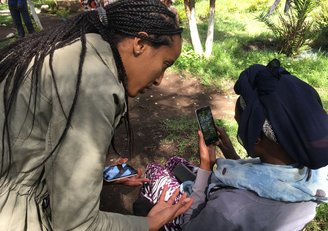The TEMACC research project aims to explore the potential of information and communication technologies (ICT) for rural development particularly to improve healthcare access and quality for mothers and children in rural communities. It is an attempt to contribute to aspects of two of the sustainable development goals namely - SDG 3: Ensure healthy lives and promote well-being for all at all ages; and SDG 5: Achieve gender equality and empower all women and girls. It is an interdisciplinary effort by professionals from the ICT fields together with specialists from public health and medicine. It rests on cooperation, built since 2006, between Addis Ababa University and the Johannes Kepler University Linz.
The objective is to develop an appropriate ICT-based service platform, which enables mothers to receive public health related information without the need to travel long distances; helps health extension workers to receive health education online or on their mobile devices by interacting with a specialist elsewhere without leaving their hometown or locality; allows collaboration and consultation among healthcare professionals, and creates virtual professional communities for improving maternal and child healthcare. Among the major technology platforms to be explored for use are: mobile phones, satellite tablets, web-based systems and related media technologies. The underlying research questions relate to whether there can be a significant improvement in maternal and child healthcare practices of rural communities using information and communication technologies. The research approach will be participatory action research with direct participation and active collaboration of the user community.
Overall, there are four aspects to be considered: (i) Provision of personalized maternal and child healthcare; (ii) Support with educational materials; (iii) Case-based knowledge sharing and (iv) Access to emergency services. This leads to the context-sensitive development of an ICT-based system with three components. The mothers system aims to make maternal and child care information on antenatal care, postnatal care, child nutrition and hygiene accessible to mothers in rural areas. The health extension workers system benefits poorly educated health extension workers in remote health posts and aims to enhance their awareness and adoption of appropriate maternal care. The professionals system addresses the life-long education needs of health professionals serving the rural community. System development will be based on requirements determination through user studies and on participatory and incremental methods. The educational materials (‘contents’) for mothers and health extension workers will be taken from the Ethiopian Ministry of Health in accordance with the guidelines of the World Health Organization. The materials for health professionals will be worked out in collaboration with medical experts. Major challenges will be: selection of appropriate contents, translation to local languages and presentation in formats adapted to the target groups, including video, audio, text and images/pictures.
The tangible outcomes will be the ICT-based system and the library of contents. There will also be an increase in awareness of mothers and health extension workers on public health issues, and in the number of health professionals engaged in consultancy. Sustainability will be achieved by local capacity building and attaching the results to the overall national strategic development. The contents can be used as basis for subsequent educational strategies by governmental or non-governmental institutions. The evaluation will take the form of a community-based intervention study by design with comparable endpoints in selected districts of Ethiopia.
